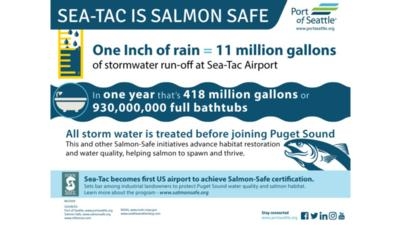First U.S. Airport To Be So Recognized
Shortly after the FAA moved to protect walruses in Alaska (we're not making that up), SEA-TAC Airport has become the first U.S. airport to achieve Salmon-Safe certification, earned for its environmental practices that protect Puget Sound water quality and salmon habitat.

The designation means that Sea-Tac passed Salmon-Safe’s comprehensive third-party evaluation of the airport’s land and water management practices, is adopting practices that go above and beyond regulatory requirements, and is committing to further reducing its environmental impact over time. Sea-Tac joins Vancouver International Airport in receiving this award.
“We are proud that Seattle-Tacoma International Airport is a national leader when it comes to environmental sustainability and it truly is an honor to be the first airport in the country to receive the Salmon-Safe Certification,” said Port of Seattle Commissioner Courtney Gregoire. “From our innovative approach to reducing carbon emissions, increasing recycling or treating runoff water, protecting the environment is a pillar of our Century Agenda.”
The airport certifications mark Salmon-Safe’s growth into industrial properties and large infrastructure projects, expanding from its 15 years of work with farm and urban landowners. Salmon-Safe currently certifies more than 800 urban and rural sites in Oregon Washington and British Columbia, representing 80,000 acres.
That includes many Northwest vineyards as well as Nike World Headquarters, the University of Washington Seattle and Bothell campuses, Washington State Department of Ecology’s headquarters campus, Vulcan development projects in Seattle, and other institutional and corporate sites.
The Salmon-Safe initiative significantly advances habitat restoration and water quality so that conditions improve for salmon to spawn and thrive. In Washington, Salmon-Safe is co-managed by Stewardship Partners.
“We are delighted with the Port of Seattle’s leadership in the aviation industry in adopting Salmon-Safe as an environmental management system,” said David Burger, Stewardship Partners executive director. “We look forward to working closely with the Port as it implements its certification commitments, and as the airport continues to raise the bar for environmental management within the aviation industry and among other industrial landowners impacting Puget Sound.”
Actions Sea-Tac took to earn designation:
- Enhancing more than 160 acres of land on and off airport site
- Improving water quality in local streams by treating all airport runoff including the use of filtration strips between runways
- Treating runoff from ramp operations, including aircraft deicing, through on-site wastewater treatment plant
- Reducing stream erosion through controlled release from detention ponds to improve spawning habitat for salmon
- Eliminating high-hazard pesticide use
- Reducing water consumption throughout the terminal
- Minimizing sediment runoff during construction projects
- Committing to low impact development for the future
The airport occupies approximately 2,500 acres of land within the city of SeaTac, Wash., approximately halfway between Seattle and Tacoma. In addition to three parallel runways and the main terminal, which has four concourses, there are two satellite terminals. Industrial activities at the airport include aircraft and ground vehicle maintenance, fueling, washing, aircraft and ground de-icing/anti-icing and other airport-related activities.
“Salmon-Safe certification for Sea-Tac and Vancouver International Airport establishes our new infrastructure certification standard as the emerging metric for environmentally innovative airports on the West Coast and beyond that seek to protect water quality and reduce impacts in their local watershed,” said Dan Kent, Salmon-Safe executive director.
(Infographic provided with SEA-TAC news release)
 ANN's Daily Aero-Linx (04.16.24)
ANN's Daily Aero-Linx (04.16.24) Aero-News: Quote of the Day (04.16.24)
Aero-News: Quote of the Day (04.16.24) Airborne 04.10.24: SnF24!, A50 Heritage Reveal, HeliCycle!, Montaer MC-01
Airborne 04.10.24: SnF24!, A50 Heritage Reveal, HeliCycle!, Montaer MC-01 Airborne 04.12.24: SnF24!, G100UL Is Here, Holy Micro, Plane Tags
Airborne 04.12.24: SnF24!, G100UL Is Here, Holy Micro, Plane Tags Airborne-Flight Training 04.17.24: Feds Need Controllers, Spirit Delay, Redbird
Airborne-Flight Training 04.17.24: Feds Need Controllers, Spirit Delay, Redbird



